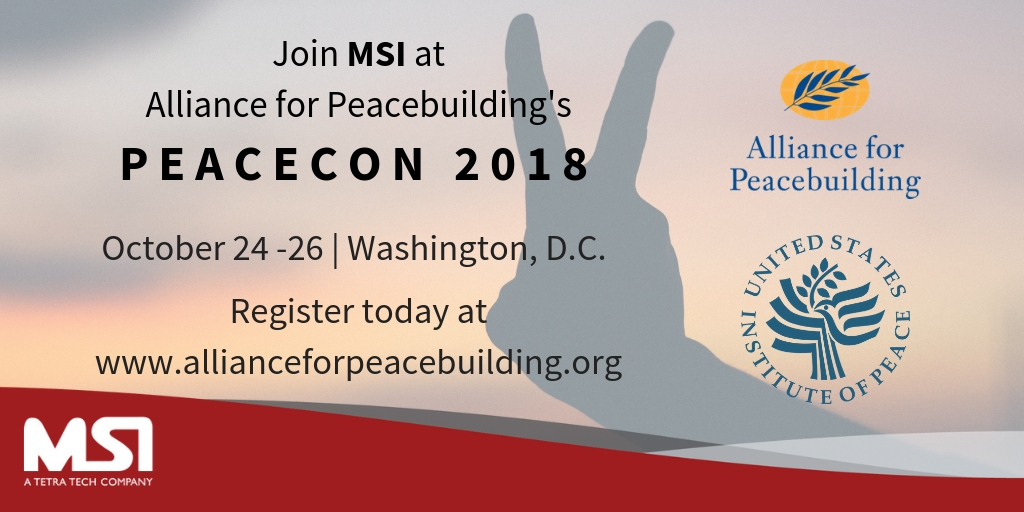Dr. Martin Luther King, Jr. once said, “Peace is not only the absence of tension, but the presence of justice.” This powerful sentiment begs the question, how can we as a society achieve it? At MSI, our experts ponder this question regularly by looking at the key elements for sustainable peace.
For instance, building legitimacy of the government at national and local levels, encouraging participatory planning of equal access to economic growth options, and engaging peace advocates across society are fundamental.
We also work to address drivers of conflict specific to countries or regional contexts. From the political and economic marginalization of Rohingya in Myanmar to the financing of a military and security apparatus using oil revenues in South Sudan, each of our development programs has the ability to support peaceful gains or exacerbate tensions. No matter the sector – agriculture, education, health – a conflict-sensitive approach to enhance peaceful outcomes is vital.
In addition, how people of various genders and sexual orientations experience life pre-, post-, and during conflict can drastically differ. Women often take on additional roles during times of conflict as both bread winner and home maker and may be compelled to take up arms while their spouse is off to war. Similarly, individuals in the LGBTI community may find themselves suddenly without their circles of support following conflict or disaster, thus increasing their vulnerability to violence.
We are constantly striving for values and beliefs of all identity groups to be respected and acknowledged — a foundation for peaceful coexistence.
Bringing Our Voices Together For PeaceCon 2018
To help cultivate changes and a greater understanding into the needs required for effective peacebuilding, each year the Alliance for Peacebuilding (AFP) brings together a network of experts, professionals, and motivated voices to share new perspectives and insights at its three-day conference co-hosted by the U.S. Institute for Peace. AFP is a membership network of over 100 organizations, including some of the world’s largest development organizations, non-profits, NGOs, academic institutions, and peacebuilding groups. This year, MSI is playing a critical role in the annual conference and will lead two panels.

The Next Wave of Conflict Sensitivity
This panel examines the future of conflict sensitivity and the challenges of integrating a conflict-sensitive lens across all development sectors. Our panel of practitioners will share experiences and examples from across the globe to highlight strides and failures of a conflict sensitive approach that will foster a discussion on specific tools for gauging opportunities for peace. The interactive session will include reflections on how we as practitioners can further mainstream conflict sensitivity into our everyday work.
- Jennifer Ulman, Senior Technical Director for Peace & Stability, MSI, A Tetra Tech Company (Panel Moderator)
- Dilshan Annaraj, Associate Director of Peacebuilding Programming, World Vision/Sri Lanka
- Michael Shipler, Associate VP for Strategy and Program Quality, Search for Common Ground
- Ioli Filmeridis, Conflict & Peacebuilding Advisor, USAID/CMM
Understanding the Role and Impact of Gender on Violent Extremism
Participants will learn about the roles and potential roles women play in VE and CVE efforts, including the broader gender contexts that shape women’s agency and that also influence men’s participation in VE. They will have an opportunity to consider the protection and safety of women and girls from VE; how social and cultural contexts shape both VE and responses to it, and the ways cultural narratives about masculinity and femininity, and social, political, and economic structures, shape women’s agency. The panel will further explore thinking on possible areas for research and programming directions for influencing the role of gender in VE.
- Dr. Lynn Carter, Senior Vice President, MSI, A Tetra Tech Company
- Dr. Leslie Dwyer, Associate Professor and Director, The Center for the Study of Gender and Conflict at the School for Conflict Analysis and Resolution, George Mason University
- Dr. Christine Fair, Associate Professor, Georgetown University Edmund A. Walsh School of Foreign Service
Blog posts on the MSI website represent the views of the authors and do not necessarily represent the views of MSI.